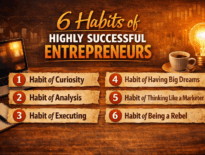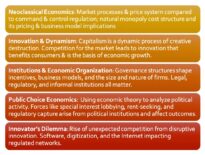
Get something straight before we waste time arguing over whether Elon Musk is an economist or Richard Branson is a glorified small business owner. Entrepreneurship, as I define it (and as anyone serious about economics should), isn’t just owning a business. It’s not opening a vape shop on Main Street, corporate innovation, or running an Etsy store for ironic crocheted coasters. Entrepreneurship is the practice of people who fundamentally create new value by bending markets, behavior, and belief to their will. It is invention in motion. It is irrational confidence weaponized by pragmatism. And it’s rare. The economics of entrepreneurship plays a crucial role in understanding this process.
Real entrepreneurs – the Bransons, Musks, Jobs, or those building category-defining startups in garages or labs right now – are not operators. They’re originators. They are people who do what others say shouldn’t be done, not because they’re rebellious, but because they see it differently and can’t not try. That distinction matters. A business owner optimizes. An entrepreneur destabilizes.
Universities and economic development offices increasingly position their work and curriculum as fostering or serving entrepreneurs, and yet what they tend to sell is a promise that they can make you an entrepreneur, more than doing the work that enables entrepreneurs.
Understanding the economics of entrepreneurship can provide insights into how entrepreneurs navigate challenges and seize opportunities in a constantly evolving market.
“By the time I began to ‘teach’ entrepreneurship, I had come to realize that it is a spectrum: at one end are people who would never voluntarily want to start their own business, at the other end are Richard Branson and Elon Musk…and in the middle is everyone else. The goal of entrepreneurship programs, therefore, is to help move people one or two spots along the spectrum.” – David S. Rose; Founder & Executive Chairman of Gust
So, here’s the question: Is this kind of disruptive human behavior a subset of economics?
(bear with me, I was asked, giving grounds to this article)
A lot has been misplaced, heck, social media counts as a news source, so let’s explore the question.
Article Highlights
Economics Is a System. Entrepreneurship Is the Glitch.
Economics, in the academic and policy sense, is the study of how scarce resources are allocated. Supply, demand, labor markets, incentives, utility curves, macro and micro equilibrium; all neat frameworks for understanding how people behave in the face of constraints.
Entrepreneurship, by contrast, is not about navigating those constraints. It’s about rendering them obsolete. Musk doesn’t ask how to maximize utility given a carbon-constrained world, he builds electric cars and rockets. Gen Z on TikTok is going about creating new ways of monetizing attention faster than the Bureau of Labor Statistics can update job codes.
Entrepreneurs aren’t solving within the system; they’re rewriting the system. They do it through the economy.
So, we have an edge case: Entrepreneurship expresses itself through economic mechanisms, but it is not governed by economic rules. It plays by the rules only until it can afford to change them. It is a behavior pattern, an economic mutation that survives only when the environment (the economy) allows it to thrive.
While we can call entrepreneurship a subset of economics for convenience, the truth is that it is more of an emergent behavior, a black swan in the behavioral flowchart of resource allocation, Gen X overlooked among generations that do both play by the rules and break them; it says “what rules?” or even “screw the roles.” Useful to economists, essential to GDP growth, but not reducible to rational incentives or systemic equilibrium.
It’s a bug in the matrix. And thank God for the bugs.
Speaking of: The Gen X Variable – A Generation of Reluctant Economists
You want to understand why the consumer internet exploded in the late ’90s and early 2000s? Why Craigslist, PayPal, Amazon, and Google weren’t government-funded research projects or Fortune 500 subsidiaries?
Look to Gen X. The whatever generation overlooked in memes.
This was the generation raised by Reaganomics, MTV, and divorce. They didn’t trust institutions because those institutions had already failed them. They weren’t trying to burn the system down like Boomers with protest signs nor storm the gates like Millennials with hashtags. Gen Xers just opted out. Quietly. Cunningly.
They didn’t cry about monopolies; they built eBay.
They didn’t whine about the music industry; they downloaded Napster.
They didn’t complain about being ignored by politics nor worry about the bias of mainstream media; they started blogs and forums and forums about blogs.
Gen X was the perfect vector for entrepreneurial thinking, not because they loved business, but because they distrusted bureaucracy. They weren’t playing the game. They were finding the backdoors and cheat codes. And they were the first generation with just enough tech and cynicism to pull it off at scale.
That’s why it’s useful to view entrepreneurship as a behavior nested within economic systems. Because the economic context (stagnant wages, regulatory bottlenecks, collapsing trust in institutions) is what allowed (or rather, forced) Gen X to invent their own economics. One that didn’t rely on jobs, pensions, or gatekeepers.
Personality Types and the Economic Misfit
Let’s not ignore the psychological angle, either. The Big Five personality traits correlate strongly with entrepreneurial success: high openness to experience, moderate conscientiousness, low agreeableness. In layman’s terms? Entrepreneurs are curious, independent, and slightly abrasive. They’re the people who would rather ask forgiveness than permission—except they never intended to ask either.
Sari Pekkala Kerr with Wellesley College, William R. Kerr of Harvard Business School & National Bureau of Economic Research, and Tina Xu with Wellesley College, have a great paper here, “students who display certain Big-5 traits (i.e., more open to new experiences, more conscientious, more extraverted, and less neurotic) and higher levels of ESE, internal LOC, and need for achievement are the group most likely to enter entrepreneurship after graduating from university.”
Combine that with generations increasingly raised with access to the tools of production (iPhones, code, Canva, and AI) and you have a recipe for rebellion through productivity. It’s no wonder Gen Z has a startup culture that seems less interested in IPOs and more interested in DAOs, collectives, and “building in public.”
Are these traits shaped by economics? Or are they a reaction to it? To a great extent they’re shaped culturally as well as by economics; and that’s where, I posit, the argument for entrepreneurship being a “subset” of economics falls apart. Economic environments can nurture or punish entrepreneurship, but they don’t cause it. Much like art flourishes under some regimes and withers under others, entrepreneurship is culture-driven and identity-bound. You don’t teach it in a class. You uncover it in a crisis.
So… Is Entrepreneurship a Subset of Economics?
Technically? Sure. If you’re the type who thinks the IRS should define what counts as innovation, go ahead and categorize entrepreneurship under the economic umbrella.
But practically? It’s like saying comedy is a subset of communication (which is ironic to point out since I’ve proposed comedy is a leading indicator of startups). You can put comedy under communication but you’re missing the point. Comedy is a form of rebellion. It breaks tension. It shifts power dynamics. So does entrepreneurship.
If we treat entrepreneurship as merely a component of economics, we undersell what it actually is: a human impulse to reimagine systems. And in that light, it becomes far more than a niche field of study or a career path. It becomes essential to progress.
The question, then, isn’t whether entrepreneurship is a subset of economics. It’s whether economics without entrepreneurship is even worth studying as what we’re all seeking is progress within whatever system we define.
If you’re shaping education policy, writing startup law, or allocating venture capital—are you treating entrepreneurs like economic actors, or like the social, cultural, and psychological anomalies they are?
Because if you’re using traditional economic tools to understand innovation, you’re showing up to a gunfight with a calculator. Instead ask what are you doing that helps break the rules?
Bonus points if you can name the painting
And share why it fits



gunfight with a calculator very funny sir ???
I think its very thoughtful how you broke down the innovative themes of younger generations. Do you think these themes spell the end of institutions as entities or institutions adopting these revolutionary themes in their structures and operations?
Aaron D. Taylor Great question. I don’t think it’s the end of institutions, but it is the end of institutions that can’t adapt. The smartest ones will absorb these revolutionary themes and evolve; the rest will get quietly bypassed (just like Gen X did to everything they didn’t trust)
Cheers Kenny
Galileo Facing the Roman Inquisition by Cristiano Banti
Paul O’Brien Startups are – or should be – a future which cannot be predicted.
Full disclosure: I like economics. It’s a fascinating way to lens the world. However, its fault is it tends to be too academic, too in-the-lab, and thus too disconnected from reality. The pondering and theory is fun. The steadfast effectively predictions about the future… silly (read: foolish).
But the debt? The debt is real. Its effects real. I don’t need an economist to tell me we need to be much more concerned.
So as both an entrepreneur and educator, I applaud that you shine the spotlight on why so many policies and norms of the past, born in the offices of huge multinationals, Big “X” consulting firms and Ivy League schools that became “good business” guides need to be redefined to fit when encouraging, supporting and “teaching” entrepreneurship.
However, the success point here is not to throw out those existing policies and norms but to refine and adapt and create new ones to fit with the needs of the entrepreneur AND understand that some of those entrepreneurial ventures will eventually grow into organizations where those policies and norms of the past will, in fact, fit.
Wow! As an entrepreneur I can completely relate to so many of these ideas!
A bug in the matrix!
Lawrence P. HOWORTH well said. The point isn’t to burn the rulebook, it’s to recognize which parts were never written for entrepreneurs in the first place. We need frameworks that start with invention and uncertainty, not scale and optimization. Ironically, the best policies for startups often look nothing like the ones they’ll need once they become institutions themselves. That’s the real challenge, knowing when to rebel and when to refine.
“Real entrepreneurs – the Bransons, Musks, Jobs, or those building category-defining startups in garages or labs right now – are not operators. They’re originators. They are people who do what others say shouldn’t be done, not because they’re rebellious, but because they see it differently and can’t not try. That distinction matters. A business owner optimizes. An entrepreneur destabilizes.”
Spot. @#$%^#@. On.
And this is why I say entrepreneurs are not risk takers (as the myth goes). They are risk mitigators. Where others see risk, they see opportunity. Full stop.
That’s not to say there isn’t risk. There is. But that’s not their concern. Risk to entrepreneurs is what adrenaline is to action sports athletes. It’s why they play the game. not why they step off the pitch and watch from the sidelines.
Mark Simchock thank you. That myth of the ‘risk taker’ completely misses the psychology. Entrepreneurs don’t seek risk; they reframe it. They instinctively spot asymmetry: where the downside is known, but the upside is invisible to everyone else. It’s not thrill-seeking. It’s calculated defiance. That’s why they move while others hesitate.
This nails what most people miss.
You’re right! Economic theory can describe behaviors after the fact, but it can’t predict the irrational courage of someone launching into the unknown.
Most frameworks try to box entrepreneurship in when the whole point is to break the damn box. Paul O’Brien
True entrepreneurship is about creating the future, not just adapting to it.
This bold vision challenges existing norms, and inspiring revolutionary change.
Paul… entrepreneurship subsumes the human mind, which is gifted with a lot more, than others can ever stretch.
Entrepreneurs prove the amazing reach of the human mind and the endless boundaries of application.
EM and RB stand testimony, while uncountable stories go unknown, unrecognised, unseen.
But that doesn’t matter.
The human mind will keep evolving in better and better entrepreneur’s.
Kudos to that.
Agree, agree. (Except extraversion. Not sure about that. ? ) And David’s Q post yesterday was spot on as well.
Thanks for breaking it down. Many ways. Too many ways haha. You leave no room for comment other than keep on keeping on
Well put, Aaron D.!
Well said. 🙂 Better ask for forgiveness than permission 😉
Well said Paul. As we built out online products for what is now the called the internet, we encountered naysayers at every turn. From time-sharing of mainframe naysayers, network bandwidth naysayers, technology naydayers, cost naysayers, and “no market” naysayers, we ignored them all—even when they were right, we pushed forward with our crazy vision.
I recall once demonstrating our CompuServe CHAT product in 1980 in New York texting to a user in San Francisco, where someone in the audience said, “why would I do that when I can just pick up the phone?”
We couldn’t do video, graphics, or even sound, but we created what is now a $20 billion dollar online games Industry. We built the first social media platforms and proved there was a market where none had existed before. And when technological or market limitations failed us, we pushed the envelope and found new approaches. Those were heady times.
Bill Louden, MSc, MIM That’s the essence of it; building not in spite of disbelief, but because you knew something they didn’t see yet. What you all created wasn’t just a product; it was proof that markets don’t exist until someone makes them. The future never starts with consensus; it starts with a few people refusing to wait for permission. Grateful for pioneers like you who made that possible.
Perhaps Gen X did our thing because we were in the shadow of the Baby Boom. Growing up in the 1980s, every few months we’d have to celebrate the 20th anniversary of something that took place in the 1960s, because the largest demographic by number had a bit of nostalgia. Patti LaBelle (born May 24, 1944, therefore as old as our parents) exclaimed “This is your Woodstock!” from the Philadelphia stage of Live Aid. And indeed it probably was sold that way, but instead of an organically popular event it was planned, organized and marketed by boomers for Gen X. Oh sure, we all watched, but when we all found out the money never made it to Africa, we got a little more cynical WRT establishment thinking and began tuning out, looking for alternatives. Which were available but in the corners of business and industry, something that the C-suite didn’t understand but also knew not to mess with.
Then there were the business leaders of the time. Not Henry Ford, but The Two Steves. Those guys messing around in the computer lab making videos, not Walt Disney’s armies of animators. Even GM figured out that they couldn’t sell displacement to us (unless it was in our 1 ton pickups), so they came up with Saturn. Eventually management got wise and tried to push the niche into the main production line, with usually disastrous results. One exception was Microsoft who somehow managed to get on top of the money game by looking the other way when we stole their core product and built our own white boxes. Boxes that impressed our parents and the boomers but in our own circles were usually a source of endless mockery at the LAN party. At least the old timers were happy to hire us to reboot their PCs.
The Internet was ours. The World Wide Web belonged to the boomers. Eventually the Web engulfed the Internet, it took one of the Steves (a boomer!) to break it. Now that Steve’s gone, the Web is taking over apps too. Shame that.
The Internet was peer-to-peer, much like those LAN parties. The WWW is client-server, like the old IBM mainframes most of the boomers cut their teeth on. One is freeform and random (and symmetrical), the other, tightly controlled and administered (and profitable). I’d say neither is more safe or secure or friendly than the other, it’s all about attitude. We of the Gen X generation would rather do things ourselves, especially if the result is far superior by our metrics.
The painting represents intellectual bravery in the face of institutional power
This is brilliantly said. Gen X didn’t rebel in protest, we rebelled in practice. While the world celebrated anniversaries of boomer milestones, we were quietly building the next ones in basements, garages, and LAN parties. You nailed it Eric: the internet was ours. It was peer-to-peer, permissionless, and beautifully inefficient, because it didn’t ask for validation. That attitude wasn’t just tech culture. It was entrepreneurship.
Insightful post on entrepreneurship.